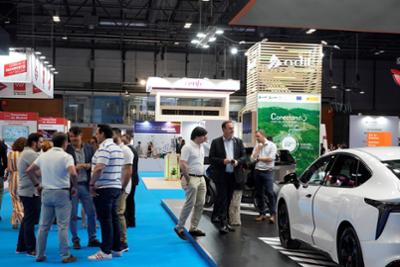

Global Mobility Call in line with COP27 on sustainable mobility and climate change
Global Mobility Call, which will be held from 12 to 14 September 2023 in Madrid, organised by IFEMA MADRID and Smobhub
The Climate Summit in November addressed the main proposals for moving towards a transport system with low polluting emissions
Global Mobility Call, the event that brings together all sectors committed to sustainable mobility, reaffirms its work in line with the proposals made at the United Nations Climate Summit COP27 to move towards low-emission transport systems.
In this context, Global Mobility Call, which will be held from 12 to 14 September 2023 in Madrid, organised by IFEMA MADRID and Smobhub, with the sponsorship of the Ministry of Transport, Mobility and the Urban Agenda, will discuss solutions for the promotion of more sustainable mobility, within the framework of cleaner, safer and more inclusive economic, environmental and social development.
Global Mobility Call was presented on 10 November at COP27 in Sharm El-Sheikh (Egypt), where its international scope was highlighted, as well as its interest in creating new alliances between sectors as diverse as those present at the summit. Both events share the objective of promoting dialogue and synergies between the stakeholders of the sustainable mobility economy, in order to jointly reduce the polluting emissions that lead to climate change, as well as to improve people's quality of life.
COP27 - held from 6 to 20 November 2022 - addressed proposals for transforming the system suited to different geographical areas. Some measures related to transport are worth highlighting, such as increasing investment in electric vehicles and sustainable mobility infrastructure.
Other issues included boosting sustainable cities and communities, achieving climate resilience, and developing a global agenda for fair transition and transformation, as well as building the capacity to develop integrated, multi-modal policy frameworks in low- and middle-income countries.
As for concrete actions, the Climate Summit called for increased investment in multimodal, safe, accessible and comfortable public transport infrastructure (including infrastructure for pedestrians and cyclists) in low- and middle-income countries, as well as greater technical support for countries whose transport systems are linked to their targets for reducing pollutant emissions.
Consultations with governments and social stakeholders identified as the main international challenges to this process the lack of funding; the limited capacity for policy development and implementation; the lack of clear and credible targets; the difficulty in regulating informal transport in southern countries; and the segregated thinking of each of the mobility sectors.
The proposals call for a concerted effort between governments and the private sector, especially the financial system, as any action to promote the proposed initiatives that is not implemented in a united manner would have little impact, an aspect that Global Mobility Call is working on through its global and cross-cutting approach involving all the stakeholders committed to the development of sustainable mobility.





